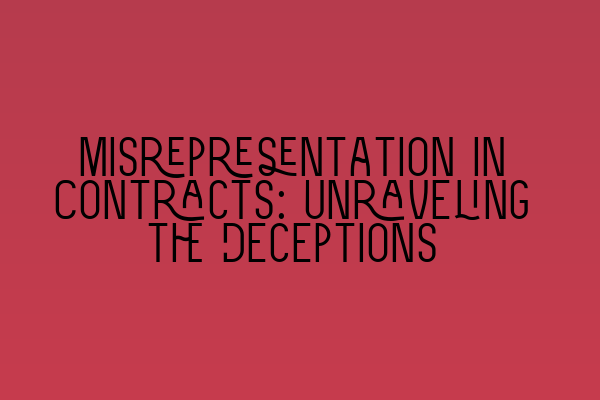Misrepresentation in Contracts: Unraveling the Deceptions
Introduction
Contracts form the backbone of commercial and legal transactions. They are a binding agreement between parties that outline the terms and conditions of the agreement. However, sometimes, contracts can be tainted by misrepresentation, which can lead to serious legal consequences. In this blog post, we will delve into the realm of misrepresentation in contracts, exploring what it is, its implications, and how to navigate through its complexities.
What is Misrepresentation?
Misrepresentation occurs when one party makes a false statement or presents misleading information to induce another party to enter into a contract. It is a deceitful practice that can distort the true nature of the contract, leading to unfair consequences for the unsuspecting party. Misrepresentation can take various forms, including false statements of fact, non-disclosure of relevant information, or even the use of ambiguous language to mislead the other party.
Implications of Misrepresentation
Misrepresentation can have severe consequences for both parties involved in the contract. The innocent party, who relied on the false information, may suffer financial losses or damages due to their reliance on the misrepresented facts. On the other hand, the party responsible for the misrepresentation can face legal repercussions, including being held liable for damages or even having the contract rescinded. Therefore, it is crucial to understand and address misrepresentation issues to ensure fair and equitable contracts.
Types of Misrepresentation
To better grasp the intricacies of misrepresentation, it is important to familiarize oneself with the different types. The most common forms include:
1. Innocent Misrepresentation: This occurs when a false statement is made, but the party making the statement genuinely believes it to be true, and they had no reason to suspect its falsehood.
2. Negligent Misrepresentation: Negligent misrepresentation takes place when a false statement is made without reasonable grounds for believing it is true, and the party making the statement fails to exercise the necessary care in verifying its accuracy.
3. Fraudulent Misrepresentation: Perhaps the most serious form, fraudulent misrepresentation involves intentionally making a false statement with the intent to deceive and induce the other party into entering into the contract.
Dealing with Misrepresentation
If you suspect that misrepresentation has occurred in your contract, it is important to take swift action to protect your interests. The first step is to gather evidence and document the misrepresentation, including any written or oral statements that you believe were false or misleading. Once you have the evidence, consult with a contract law solicitor who can guide you through the legal process.
Seeking Legal Remedies
To address misrepresentation, various legal remedies exist, including:
1. Rescission: Rescission allows the innocent party to cancel or undo the contract, restoring the parties to their pre-contractual positions. It can be sought in cases of innocent or negligent misrepresentation.
2. Damages: Damages are monetary compensation awarded to the innocent party to cover any losses or damages they have suffered due to the misrepresentation. The amount of damages awarded will depend on the specific circumstances of the case.
3. Specific Performance: In some cases, the court may order the party responsible for the misrepresentation to fulfill their contractual obligations as originally agreed upon. This remedy is often sought when the contract involves unique or irreplaceable goods or services.
Conclusion
Misrepresentation in contracts is a serious matter that requires careful attention and negotiation to effectively resolve. By understanding the different types of misrepresentation, the implications it can have, and the legal remedies available, you can navigate through the complexities of contract law to protect your rights and ensure fair and just outcomes. If you believe you have been a victim of misrepresentation, consulting with a contract law solicitor is advisable to receive expert guidance and representation.
For more information on contract law and preparation for the SQE exams, check out these related articles:
– SQE 1 Practice Exam Questions
– SQE 1 Practice Mocks FLK1 FLK2
– SQE 2 Preparation Courses
– SQE 1 Preparation Courses
– SRA SQE Exam Dates
Remember, being informed and prepared is key to success in the world of contract law.
